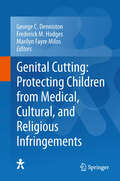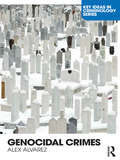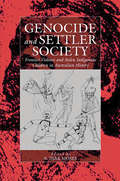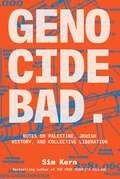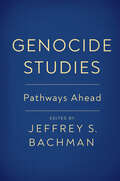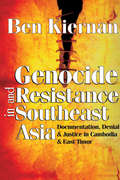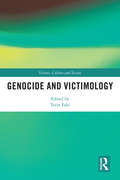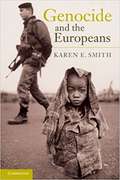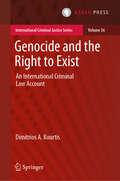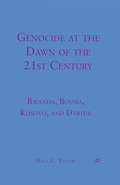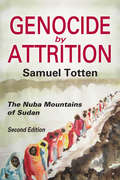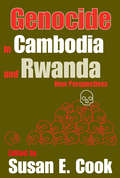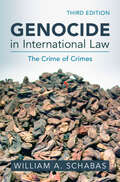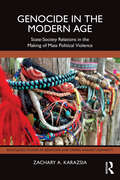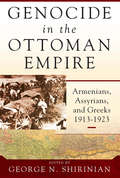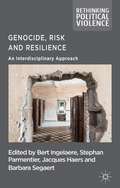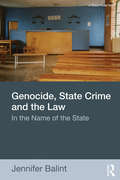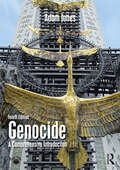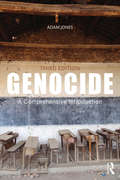- Table View
- List View
Genital Cutting: Protecting Children from Medical, Cultural, and Religious Infringements
by Frederick M. Hodges Marilyn Fayre Milos George C. DennistonThis volume contains the proceedings of the 10th International Symposium on Circumcision, Genital Integrity, and Human Rights. Authors are international experts in their fields, and the book contains the most up-to-date information on the issue of genital cutting of infants and children from medical, legal, bioethical, and human rights perspectives.
Genocidal Crimes
by Alex AlvarezGenocide has emerged as one of the leading problems of the twentieth century. No corner of the world seems immune from this form of collective violence. While many individuals are familiar with the term, few people have a clear understanding of what genocide is and how it is carried out. This book clearly discusses the concept of genocide and dispels the widely held misconceptions about how these crimes occur and the mechanisms necessary for its perpetration. Genocidal Crimes differs from much of the writing on the subject in that it explicitly relies upon the criminological literature to explain the nature and functioning of genocide. Criminology, with its focus on various types of criminality and violence, has much to offer in terms of explaining the origins, dynamics, and facilitators of this particular form of collective violence. Through application of a number of criminological theories to various elements of genocide Alex Alvarez presents a comprehensive analysis of this particular crime. These criminological perspectives are underpinned by a variety of psychological, sociological, and political science based insights in order to present a more complete discussion of the nature and functioning of genocide.
Genocide And Settler Society
by A. Dirk MosesColonial Genocide has been seen increasingly as a stepping-stone to the European genocides of the twentieth century, yet it remains an under-researched phenomenon. This volume reconstructs instances of Australian genocide and for the first time places them in a global context. Beginning with the arrival of the British in 1788 and extending to the 1960s, the authors identify the moments of radicalization and the escalation of British violence and ethnic engineering aimed at the Indigenous populations, while carefully distinguishing between local massacres, cultural genocide, and genocide itself. These essays reflect a growing concern with the nature of settler society in Australia and in particular with the fate of the tens of thousands of children who were forcibly taken away from their Aboriginal families by state agencies. Long considered a relatively peaceful settlement, Australian society contained many of the pathologies that led to the exterminatory and eugenic policies of twentieth century Europe.
Genocide Bad: Notes on Palestine, Jewish History, and Collective Liberation
by Sim KernPart activist memoir, part crash course in Jewish and Palestinian history, Genocide Bad dismantles Zionist propaganda and maps a course towards collective liberation in ten unapologetic essays. Part activist memoir, part crash course in Jewish and Palestinian history, Genocide Bad dismantles Zionist propaganda in ten unapologetic essays. Drawing connections between Biblical promises and exploding pagers, medieval dress codes and modern-day apartheid, Kern sketches a sweeping history of imperialism with their characteristic blend of far-ranging research, pop-culture insights, and scathing humor.Kern, a former teacher, journalist, novelist, and book influencer, gained international recognition as an anti-Zionist Jewish activist in the days after October 7th, 2023. At a time when social media was flooded with &“I Stand with Israel&” posts, Kern started sharing content encouraging their followers to read Palestinian books, learn Palestinian history, and question Western reporting on Palestine—videos which went viral into tens of millions of views.Despite facing hate messages, death threats, and exile from the Zionist Jewish community, Kern has remained steadfast in their advocacy over the past year. They&’ve posted daily videos on Palestinian, Jewish, and colonial history, and they&’ve raised over $500,000 in direct aid for families in Gaza—all while navigating the challenges of pregnancy, childbirth, and parenting a newborn. In Genocide Bad, Kern reflects on the life experiences that led them to anti-Zionist activism, while capturing and expanding upon their online educational content.Kern doesn&’t flinch when confronting the horrors of genocides past and present, but there is also tremendous hope contained in these pages—hope that springs from examples of courage and resilience in the face of extreme violence, and from the kinds of resistance that might just lead to our collective liberation.
Genocide Studies: Pathways Ahead (Genocide, Political Violence, Human Rights)
by Timothy Williams Adam Jones Andrew Woolford Elisabeth Hope Murray Benjamin Meiches Jeffrey S. Bachman Sara E. Brown Eva Van Roekel Esther Brito Wanda June Hollie Nyseth Nzitatira Jamie D. Wise Lauren M. BalascoIn recent years, the world has been shaken by numerous events that have caused and continue to cause massive human suffering, from the COVID-19 pandemic to intrastate and interstate armed conflicts. Moreover, climate change continues to plow ahead, contributing to growing tensions, population movements, and resource scarcity. Meanwhile, the methods by which groups and group life are threatened, and the means by which violence is incited and perpetrated, continue to evolve. Such divergent crises, even when they overlap or intersect, confound definition and label. This book seeks not to answer the question "What is genocide?" but rather "What is genocide studies?" When Raphael Lemkin coined the term "genocide" in 1944, he could not have foreseen what the world would look like today. Now is the time to think about current manifestations of genocide and those likely to emerge in the future.
Genocide and International Relations
by Martin Shaw'Genocide and International Relations' lays the foundations for a new perspective on genocide in the modern world. Genocide studies have been influenced, negatively as well as positively, by the political and cultural context in which the field has developed. In particular, a narrow vision of comparative studies has been influential in which genocide is viewed mainly as a 'domestic' phenomenon of states. This book emphasizes the international context of genocide, seeking to specify more precisely the relationships between genocide and the international system. Shaw aims to re-interpret the classical European context of genocide in this frame, to provide a comprehensive international perspective on Cold War and post-Cold War genocide, and to re-evaluate the key transitions of the end of the Second World War and the end of the Cold War.
Genocide and Mass Violence
by Devon E. Hinton Alexander L. HintonWhat are the legacies of genocide and mass violence for individuals and the social worlds in which they live, and what are the local processes of recovery? Genocide and Mass Violence aims to examine, from a cross-cultural perspective, the effects of mass trauma on multiple levels of a group or society and the recovery processes and sources of resilience. How do particular individuals recall the trauma? How do ongoing reconciliation processes and collective representations of the trauma impact the group? How does the trauma persist in 'symptoms'? How are the effects of trauma transmitted across generations in memories, rituals, symptoms, and interpersonal processes? What are local healing resources that aid recovery? To address these issues, this book brings into conversation psychological and medical anthropologists, psychiatrists, psychologists and historians. The theoretical implications of the chapters are examined in detail using several analytic frameworks.
Genocide and Resistance in Southeast Asia: Documentation, Denial, and Justice in Cambodia and East Timor
by Ben KiernanTwo modern cases of genocide and extermination began in Southeast Asia in the same year. Pol Pot's Khmer Rouge regime ruled Cambodia from 1975 to 1979, and Indonesian forces occupied East Timor from 1975 to 1999. This book examines the horrific consequences of Cambodian communist revolution and Indonesian anti-communist counterinsurgency. It also chronicles the two cases of indigenous resistance to genocide and extermination, the international cover-ups that obstructed documentation of these crimes, and efforts to hold the perpetrators legally accountable.The perpetrator regimes inflicted casualties in similar proportions. Each caused the deaths of about one-fifth of the population of the nation. Cambodia's mortality was approximately 1.7 million, and approximately 170,000 perished in East Timor. In both cases, most of the deaths occurred in the five-year period from 1975 to1980. In addition, Cambodia and East Timor not only shared the experience of genocide but also of civil war, international intervention, and UN conflict resolution. U.S. policymakers supported the invading Indonesians in Timor, as well as the indigenous Khmer Rouge in Cambodia. Both regimes exterminated ethnic minorities, including local Chinese, as well as political dissidents. Yet the ideological fuel that ignited each conflagration was quite different. Jakarta pursued anti-communism; the Khmer Rouge were communists. In East Timor the major Indonesian goal was conquest. In Cambodia, the Khmer Rouge's goal was revolution. Maoist ideology influenced Pol Pot's regime, but it also influenced the East Timorese resistance to the Indonesia's occupiers.Genocide and Resistance in Southeast Asia is significant both for its historical documentation and for its contribution to the study of the politics and mechanisms of genocide. It is a fundamental contribution that will be read by historians, human rights activists, and genocide studies specialists.
Genocide and Victimology (Victims, Culture and Society)
by Yarin EskiGenocide and Victimology examines genocide in its diverse features, from different yet connected perspectives, to offer an interdisciplinary, victimological imagination of genocide. It will include in its exploration critical and cultural victimologies and criminologies of genocide, accompanied by, and recognising, the rich scholarship on genocide in the fields of religion and history, theatre studies and photography, philosophy and existentialism, post-colonialism, and ethnography and biography. Bringing together theory with empirical research and drawing on a range of case studies, such as the Treblinka extermination camp, the Bosnian and Rwandan genocides, the Sagkeeng First Nation in Manitoba, Canada, and genocidal violence in Syria and Iraq, this book engages the victimological imagination towards an interdisciplinary, cosmopolitan victimology of genocide. Bundled and intertwined, the wide yet integrated variety of perspectives on genocide gives readers a victimological kaleidoscope to discover, and for victimology hitherto, unexplored theory and methodology. This way, readers can develop their own more epistemologically, theoretically, and methodologically robust victimology of genocide—a victimology of genocide as envisioned by Nicole Rafter. The book hopes to canvas an understanding and a starting point for a diverse appreciation of genocide victimhood and survivorship from which the real post-genocidal harms and sites, post-traumatic stress disorder, courts and tribunals, and overall meaningful justice will benefit. Written in a clear and direct style, this book will appeal to students and scholars in criminology, sociology, cultural studies, philosophy, history, religious studies, English literature, and all those concerned with not repeating a history of genocide.
Genocide and its Threat to Contemporary International Order
by Adrian GallagherFor far too long the discipline of International Relations has failed to engage with the study of genocide. This is despite the fact that genocide holds a direct relationship with the central concepts of international relations: the state, war, power, and security. This bold, innovative and unique book sets out to tackle this by bringing the concept of genocide into the discipline of IR, via the English School, in order to theorise the relationship between genocide, justice, and order. Drawing on a wide-range of primary and secondary interdisciplinary material from International Relations, Genocide Studies, Security Studies, International Law, History, Politics and Political Theory, this book aims to understand genocide within the context of International Relations and the implications that this has on policymaking. Gallagher identifies the obstacles and challenges involved in bringing the study of genocide into IR and uniquely analyses the impact of genocide on the ordering structure of international society.
Genocide and its Threat to Contemporary International Order: Consent And The Controlled Body (New Security Challenges)
by A. GallagherFor far too long the discipline of International Relations has failed to engage with the study of genocide. This is despite the fact that genocide holds a direct relationship with the central concepts of international relations: the state, war, power, and security. This bold, innovative and unique book sets out to tackle this by bringing the concept of genocide into the discipline of IR, via the English School, in order to theorise the relationship between genocide, justice, and order. Drawing on a wide-range of primary and secondary interdisciplinary material from International Relations, Genocide Studies, Security Studies, International Law, History, Politics and Political Theory, this book aims to understand genocide within the context of International Relations and the implications that this has on policymaking. Gallagher identifies the obstacles and challenges involved in bringing the study of genocide into IR and uniquely analyses the impact of genocide on the ordering structure of international society.
Genocide and the Europeans
by Karen E. SmithGenocide is one of the most heinous abuses of human rights imaginable, yet reaction to it by European governments in the post-Cold War world has been criticised for not matching the severity of the crime. European governments rarely agree on whether to call a situation genocide, and their responses to purported genocides have often been limited to delivering humanitarian aid to victims and supporting prosecution of perpetrators in international criminal tribunals. More coercive measures - including sanctions or military intervention - are usually rejected as infeasible or unnecessary. This book explores the European approach to genocide, reviewing government attitudes towards the negotiation and ratification of the 1948 Genocide Convention and analysing responses to purported genocides since the end of the Second World War. Karen E. Smith considers why some European governments were hostile to the Genocide Convention and why European governments have been reluctant to use the term genocide to describe atrocities ever since.
Genocide and the Right to Exist: An International Criminal Law Account (International Criminal Justice Series #36)
by Dimitrios A. KourtisThis book delves into the complexities of genocide as a legal concept, offering a fresh perspective by exploring the rights of groups to exist under international criminal law. It presents an in-depth analysis of group rights, challenging traditional interpretations within the context of the Genocide Convention. By focusing on the conceptual and practical implications of recognizing groups as rights-holders, this work introduces a nuanced understanding of collective rights and their enforcement. What sets this approach apart is its thorough examination of both the theoretical foundations and the operational aspects of international law concerning genocide. The book provides a critical assessment of various legal theories, addressing how these can be reconciled with the dynamic nature of international human rights practices. It also highlights the potential for these theoretical frameworks to impact the protection of vulnerable groups on a global scale. The scope of this work is broad yet detailed, encompassing an analysis that will be invaluable for legal practitioners, scholars, and policymakers. It systematically addresses the ambiguities and challenges in defining and prosecuting genocide, offering strategic insights into the enhancement of legal frameworks to prevent such atrocities. The book incorporates primary archival research that brings to light new evidence on the drafting of the Genocide Convention, including cases such as that of the Greek children, which have previously been underexplored. The primary audience for the work includes academics and students in the fields of international law, international criminal law, criminal law, human rights, and genocide studies, as well as diplomats, policy-makers, legal professionals, historians, sociologists, anthropologists, philosophers specializing in genocide, and genocide scholars in general. The insights provided will be crucial for anyone committed to advancing the understanding and implementation of international law protecting group rights. Dimitrios Kourtis holds a PhD and is a Post-doctoral Researcher and Teaching Fellow in the Department of International Studies at the Faculty of Law of the Aristotle University in Thessaloniki, Greece.
Genocide at the Dawn of the Twenty-First Century
by Dale C. TatumAt the end of World War II, the international community deemed genocide a crime against humanity. Yet, at the dawn of the twenty-first century it has occurred repeatedly. This book explains why genocide began to occur in the twenty-first century and why the United States has been ineffective at preventing it and stopping it once it occurs.
Genocide at the Millennium (Critical Bibliographic Review Ser. #Vol. 5)
by Samuel Totten"Genocide at the Millennium is the fifth volume in the acclaimed series Genocide: A Critical Bibliographical Review. This latest volume's focus is both the genocidal activity that has taken place over the past fourteen years (including that in Rwanda and the former Yugoslavia) as well as a critique of the international community's response to genocide and potential genocidal situations (including those of the United Nations and nongovernmental organizations).Genocide at the Millennium is divided into ten chapters. The opening chapter treats the Yugoslav genocide, discussing the causes of the conflict, the violence that ensued, the reaction of the international community, and the ramifications that are still being felt in that part of the world today. Chapter 2 provides a detailed and thought-provoking examination of the causes, results and ramifications of the 1994 Rwandan genocide. Chapter 3 examines the conflict in Kosovo and the events surrounding the controversial intervention by NATO. Chapter 4 discusses the remarkable efforts and successes that various non-governmental agencies have had in addressing a wide variety of issues related to genocide. Chapter 5 examines the United Nations' efforts to address the issue of genocide at the turn of the century. The role of individual states confronting issues and cases of genocide is analyzed in chapter 6. Chapter 7 gives a solid overview of the evolution of international law as it pertains to the crime of genocide and how and why major changes in such law have begun to take place in the 1990s and early 2000s. The international criminal tribunals for Rwanda and the former Yugoslavia are considered in chapters 8 and 9. The concluding chapter provides an extremely detailed and highly informative overview of key aspects of the International Criminal Court.In keeping with the multidisciplinary approach of previous volumes in the series, each of the essays and accompanying annotated"
Genocide by Attrition: The Nuba Mountains of Sudan (Genocide Studies)
by Samuel TottenThis volume documents the Sudanese government's campaign of genocidal attacks and forced starvation against the people of the Nuba Mountains in the late 1980s and early 1990s. Genocide by Attrition provides powerful insights and analysis of the phenomenon and bears witness to ongoing atrocities.This second edition features more interviews, a new introduction, and a revised and more detailed historical overview. Among the themes that link most of the interviews are: the political and economic disenfranchisement of the Nuba people by the government of Sudan; the destruction of villages and farms and the murder and deaths of the Nuba people; the forced relocation into so-called "peace camps" and the impact of forced starvation. The book also documents the frustration of the Nuba people at being left out of the Comprehensive Peace Agreement signed between the South and the North in 2005, President Omar al Bashir's threats against the Nuba people, and the crisis in the Nuba Mountains since June 2011.Genocide by Attrition provides a solid sense of the antecedents to the genocidal actions in the Nuba Mountains. It introduces the main actors, describes how the Nuba were forced into starvation by their government, and tells how those who managed to survive did so. Samuel Totten provides a valuable resource to study the imposition of starvation as a tool of genocide.
Genocide in Cambodia and Rwanda: New Perspectives
by Susan E. CookThis volume deals with aspects of genocide in Rwanda and Cambodia that have been largely unexplored to date, including the impact of regional politics and the role played by social institutions in perpetrating genocide. Although the "story" of the Cambodian genocide of 1975-1979 and that of the Rwandan genocide of 1994 have been written about in detail, most have focused on how the genocides took place, what the ideas and motives were that led extremist factions to attempt to kill whole sections of their country's population, and who their victims were. This volume builds on our understanding of genocide in Cambodia and Rwanda by bringing new issues, sources, and approaches into focus. The chapters in this book are grouped so that a single theme is explored in both the Cambodian and Rwandan contexts; their ordering is designed to facilitate comparative analysis. The first three chapters emphasize the importance of political discourse in the genocidal process. Chapters 4 and 5 examine social institutions and explore their role in the genocidal process. Chapters 6 and 7 describe the military trajectories of the genocidal regimes in Cambodia and Rwanda after their overthrow, showing that genocide and genocidal intents as a political program do not cease the moment the massacres subside. The final chapters deal with private and public efforts to memorialize the genocides in the months and years following the killing. Drawing on ten years of genocide studies at Yale, this excellent anthology assembles high-quality new research from a variety of continents, disciplines, and languages. It will be an important addition to ongoing research on genocide.
Genocide in International Law: The Crime of Crimes
by William A. SchabasThe 1948 Genocide Convention is a vital legal tool in the international campaign against impunity. Its provisions, including its enigmatic definition of the crime and its pledge both to punish and to prevent the 'crime of crimes', have now been considered in important judgments by the International Court of Justice, the international criminal tribunals and domestic courts. Since the second edition appeared in 2009, there have been important new judgments as well as attempts to apply the concept of genocide to a range of conflicts. Attention is given to the concept of protected groups, to problems of criminal prosecution and to issues of international judicial cooperation, such as extradition. The duty to prevent genocide and its relationship with the doctrine of the 'responsibility to protect' are also explored.
Genocide in the Modern Age: State-Society Relations in the Making of Mass Political Violence (Routledge Studies in Genocide and Crimes against Humanity)
by Zachary A. KarazsiaThis book explores why some episodes of mass political violence and genocide are so much deadlier than others and under what conditions perpetrators in government and society opt for brutality as a means of accomplishing their goals. Introducing the new concept of "mass political violence" to explain genocide and other mass killings in the modern world, the author investigates "how" perpetrators sustain the capacity to enact violence on a large-scale, irrespective of motives. Cases including the Holocaust, Soviet Union, Rwanda, Cambodia, the Lord’s Resistance Army, the Islamic State, the Ottoman Empire of the 1890s, Mao Zedong’s revolutionary violence, the Congo Crisis, and Darfur are used by the author to identify four types of mass political violence perpetrators – state actors, state-society coalitions, state-sponsored groups, and non-state actors to explain historical trends and identify which perpetrators are most likely to emerge in a given socio-political context and sustain violence over time. Comparative and grounded in case studies, this book will interest policymakers, diplomats, governmental advisers, practitioners, and industry researchers. It will also be invaluable to students and scholars of Political Science, International Affairs, Holocaust and Genocide Studies, Human Rights, Sociology, Anthropology, Geography, Political Psychology, Religious Studies, Gender Studies, Public Policy, Media Studies, and Criminology.
Genocide in the Ottoman Empire: Armenians, Assyrians, and Greeks, 1913-1923
by George N. ShirinianThe final years of the Ottoman Empire were catastrophic ones for its non-Turkish, non-Muslim minorities. From 1913 to 1923, its rulers deported, killed, or otherwise persecuted staggering numbers of citizens in an attempt to preserve "Turkey for the Turks," setting a modern precedent for how a regime can commit genocide in pursuit of political ends while largely escaping accountability. While this brutal history is most widely known in the case of the Armenian genocide, few appreciate the extent to which the Empire's Assyrian and Greek subjects suffered and died under similar policies. This comprehensive volume is the first to broadly examine the genocides of the Armenians, Assyrians, and Greeks in comparative fashion, analyzing the similarities and differences among them and giving crucial context to present-day calls for recognition.
Genocide, Risk and Resilience
by Bert IngelaereThis interdisciplinary volume aims to understand the linkages between the origins and aftermaths of genocide. Exploring social dynamics and human behaviour, this collection considers the interplay of various psychological, political, anthropological and historical factors at work in genocidal processes.
Genocide, State Crime and the Law: In the Name of the State
by Jennifer BalintGenocide, State Crime and the Law critically explores the use and role of law in the perpetration, redress and prevention of mass harm by the state. In this broad ranging book, Jennifer Balint charts the place of law in the perpetration of genocide and other crimes of the state together with its role in redress and in the process of reconstruction and reconciliation, considering law in its social and political context. The book argues for a new approach to these crimes perpetrated 'in the name of the state' - that we understand them as crimes against humanity with particular institutional dimensions that law must address to be effective in accountability and as a basis for restoration. Focusing on seven instances of state crime - the genocide of the Armenians by the Ottoman state, the Holocaust and Nazi Germany, Cambodia under the Khmer Rouge, apartheid South Africa, Ethiopia under Mengistu and the Dergue, the genocide in Rwanda, and the conflict in the former Yugoslavia - and drawing on others, the book shows how law is companion and collaborator in these acts of nation-building by the state, and the limits and potentials of law's constitutive role in post-conflict reconstruction. It considers how law can be a partner in destruction yet also provide a space for justice. An important, and indeed vital, contribution to the growing interest and literature in the area of genocide and post-conflict studies, Genocide, State Crime and the Law will be of considerable value to those concerned with law's ability to be a force for good in the wake of harm and atrocity.
Genocide: A Comprehensive Introduction
by Adam JonesGenocide: A Comprehensive Introduction is the most wide-ranging textbook on genocide yet published. The book is designed as a text for upper-undergraduate and graduate students, as well as a primer for non-specialists and general readers interested in learning about one of humanity's enduring blights. Fully updated to reflect the latest thinking in this rapidly developing field, this new edition: provides an introduction to genocide as both a historical phenomenon and an analytical-legal concept, including an extended discussion of the concept of genocidal intent, and the dynamism and contingency of genocidal processes discusses the role of state-building, imperialism, war, and social revolution in fueling genocide supplies a wide range of full-length case studies of genocides worldwide, each with an accompanying box-text explores perspectives on genocide from the social sciences, including psychology, sociology, anthropology, political science/international relations, and gender studies considers "The Future of Genocide," with attention to historical memory and genocide denial; initiatives for truth, justice, and redress; and strategies of intervention and prevention. Written in clear and lively prose, liberally sprinkled with over 100 illustrations and maps, and including personal testimonies from genocide survivors,Genocide: A Comprehensive Introductionhas established itself as the core textbook of the new generation of genocide scholarship. An accompanying website (www. genocidetext. net) features a broad selection of supplementary materials, teaching aids, and Internet resources.
Genocide: A Comprehensive Introduction
by Adam JonesGenocide: A Comprehensive Introduction is the most wide-ranging textbook on genocide yet published. Designed as a text for undergraduate and graduate students from a range of disciplines, it will also appeal to non-specialists and general readers. Fully updated to reflect the latest thinking in this rapidly developing field, this unique book: Provides an introduction to genocide as both a historical phenomenon and an analytical-legal concept, including the concept of genocidal intent and the dynamism and contingency of genocidal processes. Discusses the role of state-building, imperialism, war, and social revolution in fueling genocide. Supplies a wide range of full-length case studies of genocides worldwide, each with a supplementary study. Explores perspectives on genocide from the social sciences, including psychology, sociology, anthropology, political science/international relations, and gender studies. Considers the future of genocide, with attention to historical memory and genocide denial; initiatives for truth, justice, and redress; and strategies of intervention and prevention. Highlights of the new edition include: New case studies of the Uyghur genocide in the People’s Republic of China, the Rohingya Muslims of Myanmar, and Muslims in India. The historical and archaeological legacy of genocide. New and vivid testimonies of survivors and witnesses to genocide. This significantly revised fourth edition will remain an indispensable text for new generations of genocide study and scholarship. An accompanying website (www.genocidetext.net) features a selection of supplementary materials, teaching aids, and Internet resources.
Genocide: A Comprehensive Introduction
by Adam JonesGenocide: A Comprehensive Introduction is the most wide-ranging textbook on genocide yet published. The book is designed as a text for upper-undergraduate and graduate students, as well as a primer for non-specialists and general readers interested in learning about one of humanity’s enduring blights.Fully updated to reflect the latest thinking in this rapidly developing field, this unique book: Provides an introduction to genocide as both a historical phenomenon and an analytical-legal concept, including the concept of genocidal intent, and the dynamism and contingency of genocidal processes. Discusses the role of state-building, imperialism, war, and social revolution in fuelling genocide. Supplies a wide range of full-length case studies of genocides worldwide, each with a supplementary study. Explores perspectives on genocide from the social sciences, including psychology, sociology, anthropology, political science/international relations, and gender studies. Considers "The Future of Genocide," with attention to historical memory and genocide denial; initiatives for truth, justice, and redress; and strategies of intervention and prevention. Highlights of the new edition include: Nigeria/Biafra as a "contested case" of genocide Extensive new material on the Kurds, Islamic State/ISIS, and the civil wars/genocide in Iraq and Syria. Conflict and atrocities in the world’s newest state, South Sudan. The role, activities, and constraints of the United Nations Office of Genocide Prevention. Many new testimonies from genocide victims, survivors, witnesses—and perpetrators. Dozens of new images, including a special photographic essay. Written in clear and lively prose with over 240 illustrations and maps, Genocide: A Comprehensive Introduction remains the indispensable text for new generations of genocide study and scholarship.An accompanying website (www.genocidetext.net) features a broad selection of supplementary materials, teaching aids, and Internet resources.
